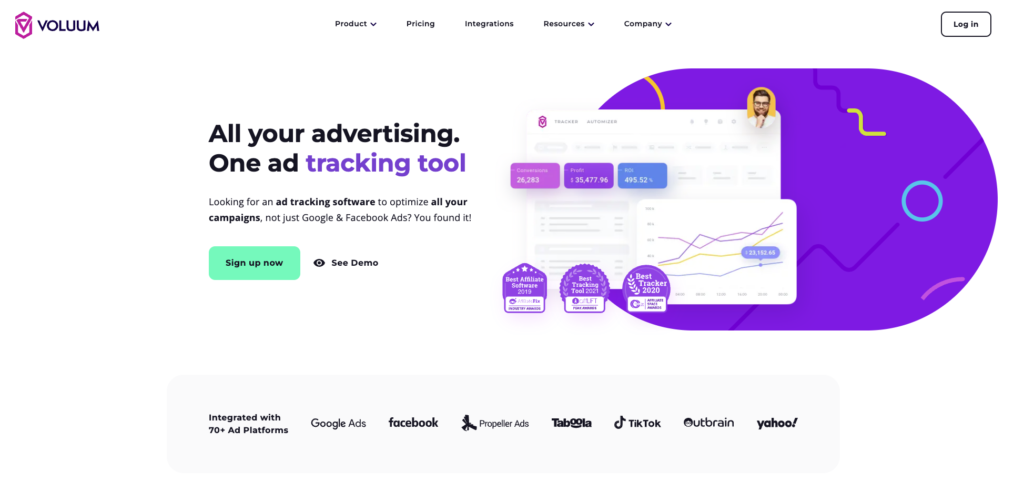Affiliate marketing is a smart way to make money by promoting products or services, in this case, on mobile devices. With the average person spending nearly 3 hours daily on their smartphones, and more than 50% of affiliate traffic coming from mobile devices – this approach has become increasingly important. Since so many people are using their phones and tablets to browse the internet, it’s essential to understand this type of marketing. This guide will help you learn how to use mobile affiliate marketing effectively. It’s all about reaching people where they spend a lot of their time – on their mobile devices. We’ll show you how to tap into this big opportunity, connect with a mobile audience, and use simple strategies to get great results. Let’s dive into mobile affiliate marketing and see how it can work for you.

Key Take-Away's
-
Mobile affiliate marketing offers lower competition and rapid growth, especially in emerging economies
-
It allows for more targeted offers, improving conversion rates and profitability
-
Challenges include design and development hurdles, with a need for specialized skills
-
Marketing tools are mostly desktop-oriented, posing a limitation for mobile-focused campaigns
-
Mobile marketing often relies on paid traffic sources, increasing costs, and faces lower click-through rates due to smaller screen sizes
Post Outline:
- What is Mobile Affiliate Marketing
- The Role of Mobile Devices in Affiliate Marketing
- Strategies for Successful Mobile Affiliate Marketing
- Tracking and Analyzing Your Mobile Affiliate Efforts
- Overcoming Challenges in Mobile Affiliate Marketing
- Future Trends in Mobile Affiliate Marketing
- What are the Advantages of Mobile Affiliate Marketing?
- What about the Disadvantages of Mobile Affiliate Marketing?
- Final Thoughts
- FAQ
1) What is Mobile Affiliate Marketing
Mobile affiliate marketing taps into the power of smartphones and tablets, transforming them into tools for effective promotion and revenue generation. It’s all about connecting the right products with the right audience through mobile-optimized strategies. In this digital age, mastering these basics is crucial for any marketer looking to make an impact.

Understanding Affiliate Networks
Affiliate networks are the matchmakers in affiliate marketing. They connect marketers with companies that want their products promoted. Think of it like a dating site but for businesses and marketers. For example, networks like ShareASale or ClickBank offer a variety of products for affiliates to promote. They handle the tracking and payments, making finding products that resonate with your audience easier. By joining these networks, you get access to numerous opportunities to earn commissions, all tailored to mobile audiences.
Choosing the Right Products and Services
Selecting suitable products and services for promotion is crucial in affiliate marketing. Think of it as curating products for your virtual storefront – you need items that resonate with your audience. For example, if your followers are fitness enthusiasts, promoting health supplements or fitness equipment could be ideal. It is key to understanding your audience’s preferences and aligning your product choices with their interests. This approach increases the likelihood of clicks and purchases, enhancing your potential for earning commissions.
Mobile-Optimized Affiliate Links
Mobile-optimized affiliate links are specially designed for a smooth experience on smartphones and tablets. These links are like bridges, leading your audience straight to the products you’re promoting, but they’re built to load quickly and look great on smaller screens. For instance, a link for a fashion blog might direct readers to a mobile-friendly clothing store page. It’s about ensuring that when someone clicks on your link, the page they land on is easy to navigate and purchase from, even on a tiny screen.

2) The Role of Mobile Devices in Affiliate Marketing
Mobile devices have taken the world by storm, transforming how we promote and buy products. Smartphones and tablets are now at the forefront, deeply influencing marketing strategies and consumer behavior. Their omnipresence in our daily lives makes understanding their role in affiliate marketing more important than ever.
Mobile User Behavior and Preferences
Grasping the habits and likes of mobile users is key for fine-tuning your affiliate marketing strategies. For instance, users prefer brief, engaging content, such as quick product demos or short reviews. They also favor straightforward shopping experiences, like simple one-tap purchase options. By understanding these patterns, including their habit of shopping during commutes or while scrolling through social media, you can craft strategies that suit their daily routines, making your affiliate marketing efforts more successful.

Optimizing for Mobile Screens and Loading Times
Optimizing content for mobile screens is like fine-tuning a race car for peak performance. Your affiliate content must look good and load fast on mobile devices. For instance, if you’re promoting a fashion brand, ensure the images are clear but not too heavy to slow down the page. Also, the text should be readable without zooming in. Fast-loading pages keep users engaged and reduce the chance of them bouncing off before seeing what you offer.
The Importance of Mobile Apps in Affiliate Campaigns
Mobile apps are a powerful tool in affiliate marketing, offering a more direct and engaging way to reach your audience. For example, if you’re promoting cooking equipment, a cooking app could include your affiliate links, seamlessly integrating them with recipes or cooking tips. Users often find in-app recommendations more relevant and trustworthy, leading to better conversion rates. By using apps, your promotions become part of the user’s daily app experience, making it more convenient for them to explore and buy products through your affiliate links.
Integrating affiliate marketing into mobile apps involves a few strategic steps. Here’s how you can do it:
- Partner with App Developers or Brands: Collaborate with app developers or brands that have apps relevant to your affiliate products. For instance, partner with a fitness tracking or workout app if you’re promoting fitness products.
- In-App Affiliate Links: Once you have a partnership, you can incorporate your affiliate links into the app’s content. For example, a recipe app could include links to cooking utensils or ingredients you’re promoting within their recipes.
- Customized Promotions: Work with the app team to create tailored promotions or advertisements that fit seamlessly within the app’s interface and user experience. This could be in banner ads, pop-ups, or embedded within the app’s content.
- Utilize Push Notifications: With permission, use push notifications to alert app users to special offers or featured products related to your affiliate links. These notifications can drive direct engagement.
- Track Performance: Use tracking tools to monitor how your affiliate links perform within the app. This data helps you understand user behavior and refine your strategy for better results.
- Offer Exclusive Deals: Provide app-specific discounts or exclusive offers to encourage users to purchase through your affiliate links within the app.
Remember, the key is to ensure that the integration feels natural and adds value to the user’s experience, rather than being intrusive or irrelevant.
3) Strategies for Successful Mobile Affiliate Marketing
Effective affiliate marketing for mobile apps hinges on adapting strategies to suit mobile user behaviors. It involves knowing how your audience uses their devices, crafting content that’s engaging on smaller screens, and making the most of social media platforms. The goal is to engage users in their mobile journey, turning scrolling into engaging users with your affiliate initiatives. With the right approach, mobile devices become valuable tools in driving your marketing efforts forward.
Creating Mobile-Friendly Content
Making content that’s perfect for mobile means designing posts that are appealing and functional on smaller devices. For example, if you’re advertising kitchen gadgets, consider making brief, engaging cooking demos that are smartphone-friendly. The goal is to keep your content sharp, visually attractive, and straightforward to navigate on mobiles. This way, your audience can easily access and connect with your material, along with your affiliate links, no matter where they are.
Leveraging Social Media for Mobile Traffic
Using social media to drive mobile traffic involves harnessing platforms such as Instagram or X to guide your followers to the products you endorse. Again, imagine you’re promoting health products; you could share health tips or success stories and embed your affiliate links in the posts or your profile. Social media is effective because it engages your audience in a space they frequently visit, boosting the likelihood of them clicking on your links and making purchases.

Email Marketing in a Mobile-Dominated World
Most emails are opened on mobile, requiring mobile-friendly email designs. For example, when sending out an email about travel accessories, the design should be attractive and simple to navigate on the phone, with easily clickable affiliate links. Making sure your emails are adaptable to different mobile screen sizes is crucial for keeping your audience interested and interacting with your promotional content.

4) Tracking and Analyzing Your Mobile Affiliate Efforts
It’s essential to track your campaigns with precision. This involves using analytics tools to understand campaign performance, guiding you to make data-driven decisions for improved outcomes. This careful monitoring is key to refining strategies and enhancing the profitability of your affiliate efforts.
Essential Tools for Tracking Mobile Traffic
For tracking mobile traffic in affiliate marketing, certain tools are indispensable. Google Analytics, for instance, offers detailed insights into how users interact with your content on mobile devices. A popular alternative for tracking mobile traffic is Voluum. Voluum is a platform that provides real-time analytics, tracking for various types of traffic including mobile, and detailed reporting across 70+ Ad Platforms. This tool is great for understanding user journeys, optimizing campaigns, and maximizing your affiliate marketing efforts. It helps you pinpoint what attracts your audience and what influences their purchasing decisions.

Analyzing Mobile User Engagement
It’s crucial to examine how users engage with your mobile content. Important aspects to track are the duration of their visits, the frequency they click on your affiliate links, and their response to calls to action. By analyzing these elements, you can discover what holds their attention and leads to sales, allowing you to adjust your content for more effective engagement and enhanced results.
Adjusting Strategies Based on Data Insights
Fine-tuning your mobile affiliate marketing strategies based on data insights is essential. Examining user interactions and sales metrics helps pinpoint successful elements and areas needing improvement. These insights guide you in modifying your approach, from altering content to shifting target demographics or adapting promotional methods. Making changes informed by data is a fundamental step in continuously enhancing the effectiveness of your affiliate marketing efforts.
5) Overcoming Challenges in Mobile Affiliate Marketing
In mobile affiliate marketing, like in any field, challenges are inevitable. However, these obstacles present opportunities to learn, grow, and innovate. Whether it’s adapting to new technologies, navigating changing consumer behaviors, or dealing with platform restrictions, overcoming these hurdles is part of the journey toward achieving success in this dynamic and ever-evolving landscape.
Navigating Platform Restrictions and Ad Fraud
Dealing with platform restrictions and ad fraud requires careful attention and flexibility. For example, platforms such as Facebook have strict guidelines on affiliate links that must be followed to avoid account issues. Utilizing tools like Adjust or AppsFlyer is crucial for identifying and preventing fraudulent activities, and ensuring your marketing efforts are secure. Being well-informed and equipped with these tools is key to adhering to platform policies and protecting your campaigns against deceptive practices.

Ensuring Compliance with Evolving Regulations
Keeping in line with changing regulations in affiliate marketing means staying current with new rules and standards, such as updates in data privacy like the GDPR. Adapting your methods to these changes is vital. Utilizing compliance management tools such as OneTrust or TrustArc can assist in ensuring that your marketing tactics are legally sound. This forward-thinking strategy is key to upholding ethical practices and steering clear of legal issues in your affiliate marketing activities.
6) Future Trends in Mobile Affiliate Marketing
It is vital to be aware of upcoming trends. With continuous technological advancements and changing consumer preferences, new prospects and hurdles emerge. Grasping these future trends is key to remaining ahead in the game and leveraging their power to refine and advance your marketing tactics.
The Rise of AI and Machine Learning in New Platforms
AI and machine learning are transforming affiliate marketing on mobile across various platforms. Consider how AI-powered chatbots can boost user interaction by offering tailored product suggestions. Similarly, machine learning can sift through user data to foresee buying trends, enabling more precise targeting with affiliate products. These advancements are streamlining marketing efforts, paving the way for more informed and strategic decision-making in affiliate campaigns.
Adapting to Evolving Consumer Behaviors
Keeping up with changing consumer trends is essential in this industry. For instance, as people start to prefer experiences, promoting travel or event-related apps becomes more effective. Similarly, the growing interest in sustainability means eco-friendly products are more appealing. By aligning your affiliate marketing tactics with these evolving interests, you can ensure your promotions are in tune with what your audience currently values and is interested in.
What are the Advantages of Mobile Affiliate Marketing?
- Less Competition: Although mobile has been dominant recently, the market is still not overly saturated
- Rapid Growth: Mobile usage is increasing faster than desktop, especially in developing countries, making it a sustainable option for the future of affiliate marketing on small devices
- More Specific Targeting: You can tailor your offers based on factors like the user’s location, device type, etc., leading to higher conversion rates and more earnings
- High-Paying Offers: Many mobile affiliate networks provide attractive payouts for a variety of offers
What about the Disadvantages of Mobile Affiliate Marketing?
- Design Difficulties: Most affiliate marketers don’t have the expertise to create a high-converting mobile affiliate website
- Development Hurdles: Creating an app requires coding skills or the need to hire a developer
Limited Tools: Most familiar marketing tools are designed primarily for desktop users - Higher Costs for Reliable Traffic: Paid traffic sources, which are often the most effective, mean increased expenses
- Lower Click-Through Rates (CTR): The smaller screen size of mobile devices limits the number of affiliate ads you can display effectively
Final Thoughts
In conclusion, succeeding in the mobile affiliate marketing game hinges on understanding its basics, optimizing for mobile devices, leveraging social media, and staying adaptable to evolving trends and consumer behaviors. The importance of this field lies in its ability to reach a vast and growing number of mobile users, offering unique engagement opportunities. It’s a highly personal and interactive marketing channel, essential for maximizing digital marketing impact. Start implementing these insights today to enhance your marketing campaigns, ensuring they resonate with your audience and drive successful outcomes.
FAQ
Can I do Affiliate Marketing on Mobile?
Yes, you can do affiliate marketing on mobile. With the widespread use of smartphones, many affiliate marketing platforms are optimized for mobile use. You can promote products, track sales, and manage your campaigns directly from your mobile device, making it a convenient option for marketers on the go.
What is App Affiliate Marketing?
App affiliate marketing involves promoting apps and earning commissions for user sign-ups, installations, or in-app purchases. As an affiliate, you market these apps through various channels like websites, social media, or email campaigns, and earn a fee for successful referrals that lead to user engagement or transactions.
1How do I Start an Affiliate Marketing App?
To start an affiliate marketing app, first identify your niche and target audience. Develop a user-friendly app that offers valuable content or services. Join affiliate networks or programs relevant to your niche, integrate their links or ads into your app, and use marketing strategies to drive user traffic.
How do Apps Make Money from Affiliate Marketing?
Apps make money from affiliate marketing by integrating affiliate links or ads into their platform. When users click these links and make purchases or sign up for services, the app earns a commission. Effective strategies include targeted promotions, in-app banners, and personalized recommendations to engage users.
What is a Mobile Affiliate Network?
A mobile affiliate network is a platform that connects advertisers with mobile publishers or app developers to promote products or services. These networks provide a range of offers specifically tailored for mobile users. Affiliates promote these offers in their apps or via mobile marketing channels, earning commissions for successful referrals.





